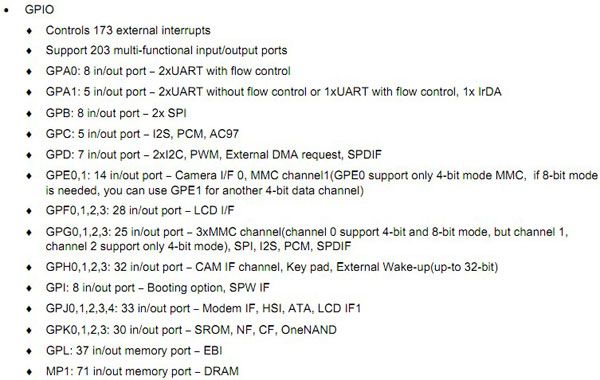S5PC100上 LED与S3C2410上 LED 驱动对比
S5PC100上 LED与S3C2410上 LED 驱动对比
作者:陈刚, 华清远见嵌入式学院 讲师。
芯片手册,电路图区别
S5PC100 芯片手册片段:



FS_S5PC100A LED电路图:

S3C2410芯片手册片段:


FS2410 LED电路图

由此资料可知S5PC100 相对s3c2410,I/O增加不少!
使用相同版本的Linux,字符驱动框架相同,只是控制的寄存器不同!S5PC100主要使用GPG3CON(0xE03001C0),GPG3DAT(0xE03001C4) 两个寄存器。s3c2410 GPFCON(0x56000050),GPFDAT(0x56000054) 两个寄存器。
FS_S5PC100 LED灯 Linux驱动
#include <linux/module.h>
#include <linux/moduleparam.h>
#include <linux/init.h>
#include <linux/moduleparam.h>
#include <linux/init.h>
#include <linux/kernel.h> /* printk() */
#include <linux/slab.h> /* kmalloc() */
#include <linux/fs.h> /* everything... */
#include <linux/errno.h> /* error codes */
#include <linux/types.h> /* size_t */
#include <linux/mm.h>
#include <linux/kdev_t.h>
#include <linux/cdev.h>
#include <linux/delay.h>
#include <linux/device.h>
#include <asm/io.h>
#include <asm/uaccess.h>
#include <linux/slab.h> /* kmalloc() */
#include <linux/fs.h> /* everything... */
#include <linux/errno.h> /* error codes */
#include <linux/types.h> /* size_t */
#include <linux/mm.h>
#include <linux/kdev_t.h>
#include <linux/cdev.h>
#include <linux/delay.h>
#include <linux/device.h>
#include <asm/io.h>
#include <asm/uaccess.h>
#define pGPG3CON 0xE03001C0
(GPFCON 0x56000050)
#define pGPG3DAT 0xE03001C4 (GPFDAT 0x56000054)
#define pGPG3DAT 0xE03001C4 (GPFDAT 0x56000054)
static void *vGPG3CON , *vGPG3DAT;
#define GPG3CON (*(volatile unsigned int *) vGPG3CON)
#define GPG3DAT (*(volatile unsigned int *) vGPG3DAT)
#define LED_ON 0x4800
#define LED_OFF 0x4801
#define GPG3DAT (*(volatile unsigned int *) vGPG3DAT)
#define LED_ON 0x4800
#define LED_OFF 0x4801
static int simple_major = 250;
module_param(simple_major, int, 0);
MODULE_AUTHOR("farsight");
MODULE_LICENSE("Dual BSD/GPL");
module_param(simple_major, int, 0);
MODULE_AUTHOR("farsight");
MODULE_LICENSE("Dual BSD/GPL");
//static int flag = 0;
/*
* Open the device; in fact, there's nothing to do here.
*/
int simple_open (struct inode *inode, struct file *filp)
{
vGPG3CON=ioremap(pGPG3CON,0x10);
vGPG3DAT=vGPG3CON+0x04;
GPG3CON=0x1111; (GPFCON= 0x5500)
GPG3DAT=0xff;
return 0;
}
* Open the device; in fact, there's nothing to do here.
*/
int simple_open (struct inode *inode, struct file *filp)
{
vGPG3CON=ioremap(pGPG3CON,0x10);
vGPG3DAT=vGPG3CON+0x04;
GPG3CON=0x1111; (GPFCON= 0x5500)
GPG3DAT=0xff;
return 0;
}
ssize_t simple_read(struct file *file, char __user *buff, size_t count, loff_t *offp)
{
return 0;
}
{
return 0;
}
ssize_t simple_write(struct file *file, const char __user *buff, size_t count, loff_t *offp)
{
return 0;
}
{
return 0;
}
void led_off( void )
{
GPG3DAT=GPG3DAT|(1<<2);
//printk("stop led\n");
}
void led_on( void )
{
GPG3DAT=GPG3DAT|(1<<2);
//printk("stop led\n");
}
void led_on( void )
{
GPG3DAT=GPG3DAT&(~(1<<2));
//printk("start led\n");
}
GPG3DAT=GPG3DAT&(~(1<<2));
//printk("start led\n");
}
static int simple_ioctl(struct inode *inode, struct file *file, unsigned int cmd, unsigned long arg)
{
switch ( cmd )
{
case LED_ON:
{
led_on();
break;
}
case LED_OFF:
{
led_off();
break;
}
default:
{
break;
}
}
return 0;
}
{
switch ( cmd )
{
case LED_ON:
{
led_on();
break;
}
case LED_OFF:
{
led_off();
break;
}
default:
{
break;
}
}
return 0;
}
static int simple_release(struct inode *node, struct file *file)
{
return 0;
}
{
return 0;
}
/*
* Set up the cdev structure for a device.
*/
static void simple_setup_cdev(struct cdev *dev, int minor,struct file_operations *fops)
{
int err, devno = MKDEV(simple_major, minor);
* Set up the cdev structure for a device.
*/
static void simple_setup_cdev(struct cdev *dev, int minor,struct file_operations *fops)
{
int err, devno = MKDEV(simple_major, minor);
cdev_init(dev, fops);
dev->owner = THIS_MODULE;
dev->ops = fops;
err = cdev_add (dev, devno, 1);
/* Fail gracefully if need be */
if (err)
printk (KERN_NOTICE "Error %d adding simple%d", err, minor);
}
dev->owner = THIS_MODULE;
dev->ops = fops;
err = cdev_add (dev, devno, 1);
/* Fail gracefully if need be */
if (err)
printk (KERN_NOTICE "Error %d adding simple%d", err, minor);
}
/*
* Our various sub-devices.
*/
/* Device 0 uses remap_pfn_range */
static struct file_operations simple_remap_ops = {
.owner = THIS_MODULE,
.open = simple_open,
.release = simple_release,
.read = simple_read,
.write = simple_write,
.ioctl = simple_ioctl,
};
* Our various sub-devices.
*/
/* Device 0 uses remap_pfn_range */
static struct file_operations simple_remap_ops = {
.owner = THIS_MODULE,
.open = simple_open,
.release = simple_release,
.read = simple_read,
.write = simple_write,
.ioctl = simple_ioctl,
};
/*
* We export two simple devices. There's no need for us to maintain any
* special housekeeping info, so we just deal with raw cdevs.
*/
static struct cdev SimpleDevs;
* We export two simple devices. There's no need for us to maintain any
* special housekeeping info, so we just deal with raw cdevs.
*/
static struct cdev SimpleDevs;
/*
* Module housekeeping.
*/
static struct class *my_class;
static int simple_init(void)
{
int result;
dev_t dev = MKDEV(simple_major, 0);
* Module housekeeping.
*/
static struct class *my_class;
static int simple_init(void)
{
int result;
dev_t dev = MKDEV(simple_major, 0);
/* Figure out our device number. */
if (simple_major)
result = register_chrdev_region(dev, 1, "simple");
else {
result = alloc_chrdev_region(&dev, 0, 1, "simple");
simple_major = MAJOR(dev);
}
if (result < 0) {
printk(KERN_WARNING "simple: unable to get major %d\n", simple_major);
return result;
}
if (simple_major == 0)
simple_major = result;
if (simple_major)
result = register_chrdev_region(dev, 1, "simple");
else {
result = alloc_chrdev_region(&dev, 0, 1, "simple");
simple_major = MAJOR(dev);
}
if (result < 0) {
printk(KERN_WARNING "simple: unable to get major %d\n", simple_major);
return result;
}
if (simple_major == 0)
simple_major = result;
/* Now set up two cdevs. */
simple_setup_cdev(&SimpleDevs, 0, &simple_remap_ops);
printk("simple device installed, with major %d\n", simple_major);
my_class= class_create(THIS_MODULE, "simple");
device_create(my_class, NULL, MKDEV(simple_major, 0),
NULL, "led");
return 0;
}
simple_setup_cdev(&SimpleDevs, 0, &simple_remap_ops);
printk("simple device installed, with major %d\n", simple_major);
my_class= class_create(THIS_MODULE, "simple");
device_create(my_class, NULL, MKDEV(simple_major, 0),
NULL, "led");
return 0;
}
static void simple_cleanup(void)
{
cdev_del(&SimpleDevs);
unregister_chrdev_region(MKDEV(simple_major, 0), 1);
device_destroy(my_class,MKDEV(simple_major,0));
printk("simple device uninstalled\n");
}
{
cdev_del(&SimpleDevs);
unregister_chrdev_region(MKDEV(simple_major, 0), 1);
device_destroy(my_class,MKDEV(simple_major,0));
printk("simple device uninstalled\n");
}
module_init(simple_init);
module_exit(simple_cleanup);
module_exit(simple_cleanup);
